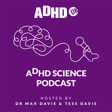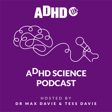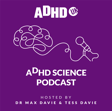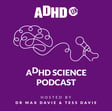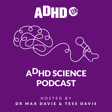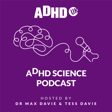Become a Creator today!Start creating today - Share your story with the world!
Start for free
00:00:00
00:00:01

Episode 23: Q&A part 3: Medications
Max and Tess answer questions from our lovely facebook group about medication!
We hope this is a helpful episode- please let us know!
and join the Facebook group at https://www.facebook.com/groups/403562932757284
Transcript
00:00:00
Speaker
Hello. Hello.
Welcome and Holiday Reflections
00:00:01
Speaker
Welcome to the ADHD Science Podcast. Welcome back. Yes, welcome back. Hope everybody had a happy holiday period. A festive period. Festive period for some, yes. It was festive period for us. We had a lovely Christmas. Why a lovely Christmas? Do you have a lovely Christmas? Yeah, it was all right. Yeah, yeah. What did you get up to? Well, you were there for quite a lot of it. Well, yeah, but I'm suspension of disbelief for whatever they say. Yeah, we just sort of hung around the house, didn't we mainly?
00:00:28
Speaker
Yeah, some friends, some family, yeah the usual. And tomorrow is the big back to work day for most of us. So we thought we'd squeeze in a quick ah recording.
00:00:41
Speaker
um So here it is. It's a Q and&A.
ADHD Medication Overview
00:00:43
Speaker
And I thought this time we would do questions about medication because it keeps coming back as an issue. um And so I made a shout out to the Facebook group um and these are the people who responded. So we're going to do the theme tune not at the beginning of the episode, but now just going to blow everyone's mind and then we're going to do the questions. Go!
00:01:16
Speaker
Tess Maxwell first question yes, or first question groups of questions from Catherine Muir. Muir? I think it's probably Muir. Catherine Muir. All right. Hi Max, thanks. Yes, my questions would be around what are the different types of ADHD medication available and how do they work? So I don't want to kind of go on at great length about this but broadly speaking there are two sorts of ADHD medication.
Stimulant vs Non-Stimulant Medications
00:01:47
Speaker
which are the, I was gonna say it and I've forgotten. Stimulant and non-stimulant. I was gonna say stimulant and depressant but that's fine. But then I thought that that wasn't right so I just worked it out. No, you were thinking about uppers and downers in a way. I am. Well that's fine because in a way stimulants are not a billion miles from Uppers, but we need to be very clear that they are very different to any kind of yeah street drugs. Yes. So if you think about, I know you're going to groan already, but you think about the kind of hungry brain analogy that I constantly go on about. love it But that is founded on the fact that there's this gap between how stimulated you feel in your everyday life and how stimulated your brain likes to be. Yes.
00:02:34
Speaker
And that gap is, I think, the source of most ADHD symptoms. Yeah, and I think that that makes sense. Yeah. Although I am biased being your daughter. yeah So the the medications act in different ways to reduce that gap. Yes. The stimulants basically act in order to make you... To raise the stimulation level to match the need. Exactly right.
00:02:57
Speaker
Whereas the non stimulants lower the need to the base stimulation level that's provided by, you know, your life. Yeah. And I don't know that we're completely clear about that. And I think the non stimulants do a couple of different things, one of which is that. um But that's as good an analogy as you're going to get and as simple as an explanation as you're going to get. Now we can that's at the level of the symptoms.
00:03:25
Speaker
that's how they work at a level of the psychology of it I suppose. and the let you know They all work in different ways in terms of ah you know what receptors they block and you know what pathways they work on but I don't tend to get too worried about that stuff because all of these pathways interconnect anyway. So if something works on dopamine or something else works on noradrenaline they will both interact they will beat they will The noradrenaline pathway it intertwines with the the dopamine pathway all the time. So you know to say something's a dopamine drug and other and the other thing is a noradrenaline drug doesn't mean that they are separate yeah in in their me in their action on the brain. yeah It's just different buttons you're pressing, but you know a lot of the um effects ultimately are the same.
Safety and Side Effects of ADHD Medications
00:04:17
Speaker
um so So that's one difference is the stimulants and the non-stimulants, in how they work. The other difference that's really important is that the stimulant circuit, the kind of medicine that you take is in your system and then leaves your system and it's like you've never taken it. It's like paracetamol or something like that. sure Whereas the non stimulants they take longer to work and they build up in your system over time So they're much more like an antidepressant or something like that. You might take or a steroid you might take for several weeks So they are not going to have an immediate effect and also They they take a long time to actually be clear about where whether we've got the right dose which makes them fiddlier to use and finally You need to take them every day
00:05:05
Speaker
Yes. Whereas the stimulants, you can have days off. It's fine. Is that all clear? I mean, what happens when you don't take ah a non-stimulant like one day out of a week? Well, it just means that your you know your kind of effect is going to drop a little bit. it's It's like you take a little... Okay, sure. The way you phrased it made it sound like something bad was going to happen. No, it's just not. I wouldn't advise it. It's not it's not the end of the world. Because then it'll it'll take away from that build-up effect that you've been working towards.
00:05:35
Speaker
okay exactly next question very relevant also from Catherine are they addictive and are they safe long term so they are not addictive people do use them recreationally though i think so but I don't really understand how that is gonna it's gonna be a make a great street drug because you know well I've heard that they I mean they have very different effects on ADHD people and on ADHD people so I mean obviously we can't see how that would be used right now sure because when we take them suddenly we have the urge to tidy our room yeah you know
00:06:08
Speaker
Yeah. I don't know how that translates. I don't fully understand. i I mean, I think they have a street value because people who don't have ADHD might want to get hold of them because they think they will help it will help them to concentrate. But it doesn't. No. So yes, I imagine there is, I mean, there is diversion mainly to college students or university students who want to concentrate better. Yeah. But it's kind of a false thing because it doesn't actually help people who don't have ADHD to concentrate.
00:06:38
Speaker
So they're not addictive. What I mean by not addictive is you don't get like, when you're addicted to something, so caffeine is a good example where you actually probably can be addicted. I probably am addicted to caffeine in some ways. Yeah, you should see this man with his Coca-Cola. I love Coca-Cola. Oh, wow. And what was that? I don't know. I love Coca-Cola. Anyway, I do love Coke. Whoa.
00:07:05
Speaker
i however um and i Yes, so I do have a craving for caffeine when I haven't had caffeine for a while. That is addiction. There's no two ways about that really.
00:07:18
Speaker
um the Other thing that's you know that sometimes that sometimes happens with addiction is that you need more and more of it to have the same effect. Now that doesn't happen with caffeine with me, and it doesn't tend to happen with caffeine, but with something like the heroin or other kind of narcotics, that will definitely happen. None of those phenomena, craving, tolerance, or any none of those phenomena happen with ADHD medication.
00:07:47
Speaker
Yes. You can, if you come off ADHD medication, you will go, you may feel quite bad because your ADHD symptoms come back. Yeah. And that will make you feel rubbish. And at the same time, when they wear off in the evening, you can get what we call rebound, cardiac hyperactivity, particularly in young children. But that's not the same as addiction. Yeah.
00:08:07
Speaker
It's not the same as withdrawal. It's a different process altogether. In terms of are they safe long term? Yes, we think so. I think it's fair to say that we would like to have a bit more long term safety data than we do, but we do have quite a lot of data.
00:08:22
Speaker
on the outcomes for people who take medication from big birth registries in Scandinavian countries like they look they basically look at the data for everyone in the whole country and people who take medication long term for ADHD they just do well I mean they do really well compared to people who don't so in that sense yeah they are very safe yeah I mean the only dangerous thing is any side effects that would come with the medication anyway and if you if you start the medication your doctor will explain those to you Yeah and then you stop the medication and you the side effects stop. yeah yeah I've never known anyone have lasting harm from these medications. and I've been giving them for... I've been prescribing them for 18 years now. As long as you've been alive. ah that's Almost exactly probably. Oh wow. Well it looks like you had your priorities right at that period of time. I better start practicing on these for when Tess needs them.
00:09:14
Speaker
Not that I prescribe to you. Let's just make that absolutely clear. I do not. Yes. No, I have a different doctor for that. Okay. Is depression or anxiety a common side effect? So this is an interesting question. The immediate starting of stimulants often in the first few weeks produces the physical sensation of anxiety. Did you did you find that when you started them? That's why I stopped taking. So you've ah for me, so anxiety has two components. One is the thoughts of, oh my gosh, this is going to happen or that's going to happen. And then there's the physical sensation of feeling your chest tighten, feeling the kind of feeling of doom
00:09:53
Speaker
yeah my well my personal experience and i've i've spoken about this briefly before um is that i got the physiological symptoms of anxiety yeah faster heart rate all of that stuff and that in turn kind of had like a it did kind of cause some feeling because you associate those two things together don't you yeah yeah yeah so it's it's not it is do you think it might be true that it doesn't cause the feelings um but it can you know, passively cause the feelings through causing the symptoms. Yeah, because you feel like there must be something wrong. And so at some level, your brain goes, what's wrong? Yeah, I mean, I was getting anxiety about why my heart was beating so far. Well, exactly. And also, what's wrong with me? Yeah, because when I was on medication, which I also am not on anymore, I used to get that as well towards the end of the day. yeah
00:10:39
Speaker
um and I knew what was happening but it didn't necessarily make it nice. So yeah, the answer is yes. Stimulants can, if you're not on quite the right dose or just doesn doesn't quite work for you, it can create a sensation of anxiety. Non-stimulants rarely will make somebody depressed and that's definitely true and it is a reason why sometimes we have to take people off those medications. It is unpredictable.
00:11:06
Speaker
Well, one of the problems with non stimulants is that they are unpredictable in their side effects. Whereas the stimulants are very predictable in their side effects. They will often cause this kind of feeling of kind of anxiety. They will often cause appetite suppression and they'll often cause you to not sleep. So I'm just running them off quickly just because I don't think Catherine's asked about them.
00:11:26
Speaker
um Whereas the non stimulants are much more unpredictable. And so yes, low mood is one of the things that we find. Do you know what it is that causes that side effect? I do not know. Fair enough. I mean, I think if you're messing with brain chemistry, it's not quite the word, but if you're influencing brain chemistry, I think you can influence mood in lots of different ways. And I think that's as far as you go.
00:11:52
Speaker
Next question. Yeah. Yes. Okay. Um, whoa, that was weird. Okay. One of the things I come up against is, Hey, I'm just leaving a break. So it's easier for you to edit this. Okay, cool. Sorry. I didn't mean to hit you like that.
00:12:09
Speaker
One of the things I come up against is people not understanding that taking an amphetamine based ADHD medication is not the same. Oops. Sorry. It's not the same as taking speed, for example. Yeah. and I now think.
00:12:22
Speaker
That's something that people say to dismiss the idea. and it's It's not really helped by the fact that one of the medications, the first line medication for ADHD is literally called, for adults, is literally called Lizdex amphetamine. It's in the name. um Where an amphetamine, you know certain forms of amphetamines are used to speed. But it's like,
00:12:46
Speaker
I mean it just has a different approach different effect on the brain, it's like the difference between, I don't know, grass is grass, like grass is a plant and so is grass. Yeah. The drug. You know, it's that they've got the same name, but they don't have a completely different effect. Yeah. um You know, I wouldn't, well, you can try drying and smoking the grass that comes from our garden, but I don't think you'll get very far with that. I don't want to do that. I wouldn't suggest it. um So I think
00:13:20
Speaker
Yes, I mean it's very difficult. You can just say it is just completely different stuff, but the think the fact is chemically it's related and you've got to say that yes, that's true. The speed and amphetamines and cocaine, all of those things are stimulants. Yes, that's true as well, but that's where the similarity ends. These are non addicting drugs who do not have any of the adverse effects of amphetamines and speed and cocaine.
00:13:48
Speaker
Okay. Thank you, Catherine. That's the end of Catherine's question. Our next lot of questions is from Amy Hughes. Amy Hughes. amy I went to university with Amy Hughes. Did you? Well, happy, happy. Happy and happy me. I don't know. I was going to say congratulations, but I know. That would have been something when we went to university. Okay. Okay.
Medication Management and Alternatives
00:14:09
Speaker
Um, are medication breaks really necessary, especially if the child slash teen not particularly keen?
00:14:15
Speaker
yeah so medication breaks is something that we have traditionally done in the past but it's not I mean it depends on the patient doesn't it yeah I mean the reason for doing them is basically particularly for methylphenidate or other medications just to see if they're still working because you can go on through life and go ah la la la la la you know you can't do that My ADHD is doing well. yeah Basically, a lot of my patients transmit their symptoms in the medium of song. There's something that happens. And, you know, sometimes it is helpful to go, well, actually, is this stuff that we're giving you, is it actually doing anything?
00:14:55
Speaker
Yeah. But I don't know that I do that very often because very often you're like, well, yeah, it's helping, but I'm getting a bit of sleep, a bit of appetite suppression. So I know it's doing something. So if I take it away, it's probably going to make their their ADHD worse because we know there's ah an effect there.
00:15:14
Speaker
um So I don't do it very often and the implication of Amy's question is that some clinicians make people do a medication break against their will. I'm not okay with that. I just don't think it's okay. Yeah. Because it's kind of harks back to an era where healthcare care was done to you, not with you.
00:15:36
Speaker
Yeah, so they they they may be helpful, but they're never like completely necessary. No. Especially if you know the patient doesn't want to stop the medication. Yeah. And just as an aside, they I wouldn't recommend them in non-stimulants for the reasons I've just given about stopping yes that yes and starting again. ah But they can be quite helpful and if you're taking melatonin, which is not a directly ADHD medication, but is a useful medication for sleep.
00:16:04
Speaker
Um, where a medication break can actually be really helpful. So that's just ah a little aside. Okay. Oh, by the way, I was meant to say at the top of the episode, but this it becomes relevant from now on. I think none of this is medical advice. Right.
00:16:19
Speaker
just to say. Carry on. I mean, is it not advice in a medical? it's Is it just illegal? That's illegal. That's a legal legal thing. Because you can what you well you can't do is say, well, this doctor on a podcast said I should do that. So that's yeah so that's why I refuse to do my medication. Because everything is dependent on context. Absolutely. Everything is dependent. Because, you know, i'm i'm I mean, i'm I'm scared to say this to him, but you don't know everything. don i know My whole world has been shattered.
00:16:49
Speaker
So yeah, next question. Right, yes. Some children only get nine to 10 hours from the 12 hour preparations of stimulants. What do you think of top up doses when required for study or to perform in some way, ah for example, early morning slash late night sport?
00:17:05
Speaker
Is that just taking more than one of your prescribed medication? No, it isn't quite. Okay. um So that that's a really good clarification. So the medication, this is basically about methylphenidate, which is the main one that we give. There are different preparations of other things, but let's talk about methylphenidate, which is our first line and is the big one.
00:17:27
Speaker
there It comes in different preparations which are labelled as 4 hour, 8 hour, 12 hour, whatever. But the amount of actual effect really depends on someone's metabolism. And interestingly I think that sometimes you can start off having a 12 hour effect and then over time as the person gets better at metabolising the medication then that will start to decay. So your tolerance can go down.
00:17:50
Speaker
well it's not the same as tolerance in would you that's a very very good point um no no no i have thought of this before no no don't worry you haven't completely got me um it's not tolerant to something like a narcotic is you need this a larger amount to get the same effect this is increased metabolism which means you need the larger amount to go into your body to have the same amount in your bloodstream which is different right because in the other instance you need a large amount in your bloodstream to have the same effect gotcha so it's much less dangerous and so so it is different but that's a really great that's a really great point but to to answer Amy's question the amount of
00:18:39
Speaker
The duration of effect is wildly variable. Some people get a lot of effect, you know, longer than you would expect and then it can affect sleep. What I tend to do if somebody is getting less effect than I would expect or increasingly that in the last year or so, you just can't get hold of the 12 hour ones, which is really annoying.
00:18:58
Speaker
you sometimes will do like an eight hour one or you'd give a 12 hour one but it won't last 12 hours and then you'd give a four hour preparation usually when the young person comes back from school. Right. So that allows them to have an evening covered with a bit of medication but also for it to wear off in time to go to sleep. Okay, so that covers the late night sport thing. What do you think about the early morning side of things? Yeah, that can be tricky and because a lot of the medications which are given once daily are a mixture of immediate release and slow release. So it can take a while to build up.
00:19:34
Speaker
There's a few options here, you could give, I don't want to necessarily market one form, but there is a form called MediConnect XL that has, um I have no relationship with the manufacturers by the way, um has is a bit quicker than the others to start.
00:19:53
Speaker
Canet is the clue. The other thing that some people do is that they wake up early, take the meds, go back to sleep for a bit. If you're able to do that, that can be quite effective. Because then when you actually wake up for the day, your meds have kicked in. Yes. But that is not great if you're not somebody who can drop bob drop back off to sleep. It would be a disaster for me, for instance. ah So those are the options. Oh, yes. And also it taking some immediate release alongside your slow release is an option.
00:20:21
Speaker
Yeah? Yeah. it so I mean, speak to a doctor about it. Yeah. But that's your perspective. Okay. Is there any advantage in moving to L. Vance from methylphenidate as get into later teen years? So, um, the context of this is that L. Vance, which is listex amphetamine is the first line for adults. Right. Whereas methylphenidate is the first line for children.
00:20:45
Speaker
Oh God, I better switch. Well, no. Well, I'm not sure that that's true, because the basic thing... Okay, because I'm in my later teen years, so this is... Yeah, you very much are. It may be relevant. um You could do. The reason that one of the problems with the evidence base is that none of the drug companies, and this is very naughty, none of the companies will run drugs against each other.
00:21:09
Speaker
They won't compare methylphenidate and lystax amphetamine to each other. Why? they will Because it's not worth their while to do that. It's much more, it's much, you know, you're much better off comparing it to placebo because it's gonna be better than that. If you're if you're running two things off a gu run by made by different organ, by different um manufacturers, well that's not particularly helpful.
00:21:33
Speaker
ah and Not particularly helpful to your bottom line and to your marketing. Whereas if you um Run it against placebo you can say look at what it does. it's so It's so effective and great So that's a slightly cynical view people do run them against each other and it's not completely honestly it's not completely clear there was a big systematic review of medication for ADHD Fairly recently and actually a methylphenadent came up on top for adults in terms of the evidence base and What's the actual difference between what they do? Do they just like... have They're both stimulants. yeah I mean, al vance' you know you could you could talk about it in terms of elvance being norogenergic, so it it runs on the norogenergic noradrenaline pathway within your brain. But as I've said, that does not necessarily mean it's radically different.
00:22:25
Speaker
My experience of it is that it's stronger than methylphenidate. I see. So it is more potent, I would say. m It's probably more likely to have an effect, but it's also more likely to have side effects.
00:22:38
Speaker
Yes. So it's just like increasing your, your dosage, right? Yeah, I think so. But I think if you are, if you're getting to a point where you're not having an effect from middle of the day, it is an option in the older teenage years, but I wouldn't automatically swap someone from one to the other just because they happen to hit 18 because that doesn't really make sense to me. Yeah. If it's working, it's working. It's working. It's working.
00:23:02
Speaker
okay teams are at risk of impulsive behavior at times when medication not active brackets late night etc any strategies that might help with this ooh at risk of impulsive behavior do you want to talk about this one i don't know i don't know the answer to this one actually if i'm honest because i think it depends on what the behavior is Yeah, also, teenagers are sometimes just
Teen ADHD Challenges and Caffeine Comparison
00:23:26
Speaker
like that. Yeah, yeah they are literally just like that. I don't know, I kind of, I found that my medication doesn't really help with my impulsivity. I know that it's different for everyone. I think I can't speak on this myself because it never really had an effect for me. I've just kind of always been like this.
00:23:41
Speaker
And I think, in a way, the thing you've got to remember about teenagers is that they do their impulsive behaviours, but it doesn't exist in a vacuum. A lot of the stuff that, if you say, my child is at risk of impulsive behaviours, you don't mean bouncing on their bed or, you know, flicking toothpaste at the wall. You mean going out with their friends and drinking or doing whatever.
00:24:02
Speaker
ah Do you know what I mean? but you know what i mean you know yeah that's code It's not code for something silly and harmless. It's a code for risk taking behaviours. Risk taking behaviours do not happen in a vacuum. They happen in the in a peer context. And what I mean by that is they happen primarily often because you're pressured to do so by your peers. What was it you were talking about earlier about hyperactivity Increasing after medication is warm off. Yeah, it could be it could be that your ah Rest, I mean hyperactivity when you get to teenage years is less of a prominent symptom. But yes, you're right You could have a bit of restlessness and need for goat to go and do something
00:24:45
Speaker
once your medication is worn off. So that could be a strategy. I mean, that could be a factor. But I think ultimately, I don't think we should think about risk taking behaviour in adolescence as being an ADHD symptom.
00:24:58
Speaker
I think we should think of it as ah kind of a a product of the person's own peer relationships, how they see themselves, how they're trying, you know. True, but I mean, the ADHD does definitely factor into it. I think it probably factors into it. but ah But only in the way that it factors into every other aspect. aspect Absolutely everything, yeah, yeah, exactly. Yeah. Any strategies you can think of?
00:25:19
Speaker
Well, I think, but I think if you, if you think... Lock the doors. Well, no, I think if talking to your young person about, well, what is it that's driving you to do this and why is this important to you? And thinking, exploring with them what it what it is, it what is it about this behaviour that is adding value to them socially? You know, what, what, or and is there anything else that they can do instead to to gain that social value, that social currency? That's what I would say.
00:25:48
Speaker
Gotcha. Okay, that's drawing the line on Amy Hughes. Thank you, Amy. Thank you, Amy. Moving on to Richard Mouse. Yes. A new member of the community. Oh, welcome. Welcome. Welcome, Richard. His first question is the difference between caffeine, adenosine, adenosine receptor blocker, and usual ADHD stimulant dopamine reuptake inhibitor. Okay.
00:26:15
Speaker
go on caffeine yeah adenosine receptor blocker yeah explain so caffeine blocks this thing called adenosine adenosine this is a really great example of the fact that all of these different neurotransmitters are interconnected so by blocking adenosine adenosine neurons that use adenosine are often basically there to suppress other neurons that run other kinds of neurotransmitters. So it just kind of slows down everything. So adenosine is basically a slowing down thing and it it's almost like it takes the brakes off. Right. A bit. So adenosine kind of slows everything down. Yeah and caffeine blocks the adenosine. Blocking the receptor for adenosine means that everything is locked. Whereas the ADHD stimulants will just
00:27:07
Speaker
You know, it's like taking the brakes off versus putting the accelerator on. You put the accelerator on using your stimulants, whereas caffeine stops the brakes coming off. But it feels quite similar, doesn't it, really? Yeah. I mean, I've kind of taken to coffee instead of my meditation now. So so there are there are definitely similarities between the effect the effects, um but they are fundamentally acting on different pathways. Yeah.
00:27:32
Speaker
I mean, do you think it's also worth mentioning the difference between a receptor blocker and a reuptake inhibitor? Oh, okay. Or is that too much? I think that might be too much. It's not really relevant, is it? Okay, now let's quickly think about it. You've got one neuron which screeches stuff and you've got another neuron which is near it and it's got this gap. Synaptic transmission. Synaptic gap in the middle of it and the synaptic gap is like a little soup of all of these neurotransmitters. It feels like I'm doing my air levels again. So the one that's transmitting will so squeeze out a certain amount of neurotransmitters. Yeah. And then re-uptake inhibitors will stop any... It will keep it in the gap. Keep it in the gap rather than going back into the transmitting neuron. The receptor blockers will keep it in the gap rather than being taken into the... will stop it getting into the the the the receiving neuron.
00:28:26
Speaker
Yeah. So it's like, if you keep sneaking out to go to your friend's house, the difference between locking your door and locking their door. Okay. I like that. Yeah. Yeah. Yeah. Okay. That's good. But actually the net effect of both of those, yeah, it's complicated because the net effect of a reuptake inhibitor is actually to increase how, how much of that neurotransmitter gets transmitted. Sure. Whereas the net effect of a receptor blocker is to reduce the amount of transmission of whatever neurotransmitter you're talking about.
00:28:56
Speaker
You know what? Okay. Yeah? Okay. We'll leave that one. Um... God, where are we? Okay. caffeine effects on pineal gland. What's that? Pineal. Pineal. That's fine. One of the wonderful things about having these kind of communities is that you kind of have to kind of go, I did not know that was a thing, and then you have to look it up. Do you not know pineal? No, I know that pineal gland is a thing. It's important. Right. But I did not know that caffeine had an effect on it. And I've just been doing some research. So thank you, Richard, for making me do research, which is one of the reasons to do this podcast. I would love to meet a guy named Pineal.
00:29:34
Speaker
pint He's Neil and he lives, he works in a pie shop. Oh, that'd be great. Oh God. um Okay. So the pineal gland, the most, the most important thing about the pineal gland is it secretes our old friend melatonin. and So it's very, very important in your um circadian rhythm. It's very important in regulating sleep, blah, blah, blah, blah, blah.
00:30:00
Speaker
yes the caffeine affects your sleep we know this by suppressing the production of melatonin but it appears that Chronic caffeine intake, although I don't know to what level, can have a long-term effect on the pineal gland and make it potentially harder to sleep longer term. I don't know that, I think it's always really important when you're reading research that shows a potential anatomical change that does not necessarily mean that it is a functional change. Those are two different things. What do you mean?
00:30:38
Speaker
So the fact that someone's pineal gland might shrink doesn't mean it's necessarily going to work any less well. Right, gotcha. um by it might It might well do and it's plausible to think it might but you don't you can't be sure.
00:30:54
Speaker
So yes, I think there's some valid concern about caffeine's effect on the pineal gland. I think it's a little bit off topic, but anyway, thank you. Okay.
ADHD Medication Myths and Market Dynamics
00:31:05
Speaker
you know Oh God, I'm going to need your help here. Okay. So unique qualities of.
00:31:09
Speaker
vivants such as better a ability such a better availability of lysdex amphetamine than other amphetamines the manufacturing process to encapsulate these lysdex into beads and the additional chemistry of v to make it less addicting so i've left this the question i've left this one in okay i've left this one in Because I basically don't think that any of that is actually a thing So I think one of the things that's really interesting as the internet becomes opener and more and more open Is that drug companies even though they're not allowed to market directly to consumers they can only market to doctors they
00:31:50
Speaker
ah Somehow people are getting stuff like this out So if you are the manufacturer of white vivants, which is the exactly the same thing as elvants It is exactly the same. Is it just like a brand? It's another brand of the same drug, right? So all of the manufacturers do this They will always say the reason why my our drug which is exactly the same as the other person's drug is better is is some quirk of the manufacturing process but the the contents of the medication is the same exactly the same right so what's the point of having multiple companies well i think ah well capitalism i suppose also like don't say in it well i mean who are you well no i mean capitalism
00:32:35
Speaker
It is a privatized industry sure that does make sense there is there is demand for something and actually in a minute I'm going to praise the drug companies for something for for something else. I can't wait in the meantime spoiler In the meantime, you know, they do talk a lot of nonsense about the difference between they're essentially identical I mean also everyone company goes under you still got the other one Yeah. And also there's false there's there's also a false premise there. um They're not addicting, so one me can't be less addicting than the other because neither of them are addictive at all. So that's fine. Great. So unique qualities of Waivants? None. None, nearly. I can find out.
00:33:15
Speaker
Okay. ah Are you going to praise the drunk companies now or do we have to wait? No, in a minute. Okay, just let me know when it's about to happen. I'm so excited. ah US s and probably UK quantity restrictions on releasing drugs to the open marketplace, which then caused... Well, let's go on to the next one.
00:33:34
Speaker
Oh, okay. So the US did have some restrictions on how much volume... I thought it was just being dramatic. That's fine. I was like, whoa, Richard. Richard, yeah. Okay, go, go, go. So the US did appear, and I'm not a massive expert on pharmaceutical regulations.
00:33:57
Speaker
um But they did appear to have some restrictions on how much medication could be manufactured and could be released into the market in the states. Those were lifted which led to a massive amount of a spike of demand in the states.
00:34:11
Speaker
um i Don't think the UK government has those restrictions to be honest. you I've never been aware of any um Quotas or anything on the amount of medication that pink can be given in the UK So I just don't think that is something that we've done um but nonetheless dot dot dot that is useful background to the shortage of let me ask you the question about the shortage background of shortage caused by manufacturers limiting production and inventory supply until only when the US government came around to easing up supply laws smiley face yeah so i mean i think you know these these companies are exist to make money and that that is their purpose and they make the product and they sell the product so if they if the if the US government is not going to allow them to sell their product they're not going to produce it and they suddenly allow them to sell it
00:35:03
Speaker
they're going to sell it. And then the rest of the world may well suffer in terms of supply because a lot of these companies are US based. Yeah. um I'm not really sure I understand the question. Is it that um when the US government eased up supply laws, there was an increase in production There wasn't, that's the problem. There was an increase in demand. And then there now has been an increase in production. Because the US government eased up supply laws? Yeah, because the increase in production lagged... I thought that was what I said. Did I say something else? That's fine. The reason for shortage is that the increase in production lagged behind the increase in demand. Right, okay. Well, that makes sense. That's sensible. That's economics, isn't it?
00:35:44
Speaker
I've done it in it again. Capitalism in it. good Economics in it. That's how I do it. Okay, so that's economics. I'm quitting the podcast. No, I've only one more in it. Oh no. Oh God. um so Yeah, that is how economics works and and the the production has lagged behind the demand. Now the production, this is where I give the drug companies some credit. they have They have now stepped up production and the reason why the shortages are easing, although they are not over, is because the drug companies have stepped up.
00:36:23
Speaker
Yes! So they have done, ah you know, that's that's a good thing that companies do. Capitalist companies are good at responding to demand. That is an advantage of the system. Capitalism, isn't it?
00:36:36
Speaker
ah ah Now I'm going to quit the podcast. But yeah, capitalism. It'll just be me reading people's questions and then saying, I don't know.
00:36:47
Speaker
You'd be very good with the scientists. That would be fine without me. You'd be fine. I think I'd just zone out and then the podcast would trail off. Okay, that's the end of the questions. If there's any other questions that have come,
Conclusion and Future Insights
00:36:58
Speaker
please let us know. Shout out to Catherine, Amy and Richard. Now the other thing to say about Richard is that he said that's something very nice on the Facebook group. He said some nice things about me, but the main thing he said was about you Tess and how he thought that you were a therapist and that you were much older because you're so wise and you're so intelligent. So there you go. Stop it Richard, thank you very much. There you are.
00:37:19
Speaker
um so that's it for today um anything else to impart Tess oh god you put me on the spot um um no good you're going back to work soon i'm going back to soon so we don't know when we're having another episode although we have got another guest coming up so that will be fun um I don't know when I'll be able to get that out. But anyway, I hope everyone has a lovely January. Please join the Facebook group and say hi and goodbye. Goodbye. Bye bye. Bye bye. Goodbye.
